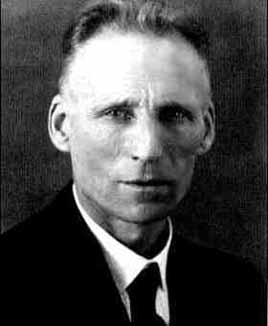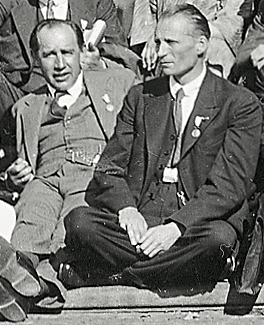L. E. J. Brouwer facts for kids
Quick facts for kids
L. E. J. Brouwer
|
|
|---|---|
 |
|
| Born |
Luitzen Egbertus Jan Brouwer
27 February 1881 Overschie, Netherlands
|
| Died | 2 December 1966 (aged 85) |
| Nationality | Dutch |
| Alma mater | University of Amsterdam |
| Known for | Brouwer–Hilbert controversy Brouwer fixed-point theorem Brouwer–Heyting–Kolmogorov interpretation Jordan-Brouwer separation theorem Kleene–Brouwer order Phragmen–Brouwer theorem Tietze-Urysohn-Brouwer extension theorem Simplicial approximation theorem Bar induction Degree of a continuous mapping Indecomposability Invariance of domain Spread Proving hairy ball theorem Intuitionism |
| Awards | Foreign Member of the Royal Society |
| Scientific career | |
| Fields | Mathematics |
| Institutions | University of Amsterdam |
| Doctoral advisor | Diederik Korteweg |
| Doctoral students | Arend Heyting |
| Influences | Immanuel Kant Arthur Schopenhauer |
| Influenced | Hermann Weyl Michael Dummett Ludwig Wittgenstein |
Luitzen Egbertus Jan Brouwer ( 27 February 1881 – 2 December 1966), usually cited as L. E. J. Brouwer but known to his friends as Bertus, was a Dutch mathematician and philosopher, who worked in topology, set theory, measure theory and complex analysis. He is known as the founder of modern topology, particularly for establishing his fixed-point theorem and the topological invariance of dimension.
Brouwer also became a major figure in the philosophy of intuitionism, a constructivist school of mathematics in which math is argued to be a cognitive construct rather than a type of objective truth. This position led to the Brouwer–Hilbert controversy, in which Brouwer sparred with his formalist colleague David Hilbert. Brouwer's ideas were subsequently taken up by his student Arend Heyting and Hilbert's former student Hermann Weyl.
Biography
Early in his career, Brouwer proved a number of theorems in the emerging field of topology. The most important were his fixed point theorem, the topological invariance of degree, and the topological invariance of dimension. Among mathematicians generally, the best known is the first one, usually referred to now as the Brouwer Fixed Point Theorem. It is a simple corollary to the second, concerning the topological invariance of degree, which is the best known among algebraic topologists. The third theorem is perhaps the hardest.
Brouwer also proved the simplicial approximation theorem in the foundations of algebraic topology, which justifies the reduction to combinatorial terms, after sufficient subdivision of simplicial complexes, of the treatment of general continuous mappings. In 1912, at age 31, he was elected a member of the Royal Netherlands Academy of Arts and Sciences. He was an Invited Speaker of the ICM in 1908 at Rome and in 1912 at Cambridge, UK.
Brouwer founded intuitionism, a philosophy of mathematics that challenged the then-prevailing formalism of David Hilbert and his collaborators, who included Paul Bernays, Wilhelm Ackermann, and John von Neumann (cf. Kleene (1952), p. 46–59). A variety of constructive mathematics, intuitionism is a philosophy of the foundations of mathematics. It is sometimes and rather simplistically characterized by saying that its adherents refuse to use the law of excluded middle in mathematical reasoning.
Brouwer was a member of the Significs Group. It formed part of the early history of semiotics—the study of symbols—around Victoria, Lady Welby in particular. The original meaning of his intuitionism probably can not be completely disentangled from the intellectual milieu of that group.
In 1905, at the age of 24, Brouwer expressed his philosophy of life in a short tract Life, Art and Mysticism, which has been described by the mathematician Martin Davis as "drenched in romantic pessimism" (Davis (2002), p. 94). Arthur Schopenhauer had a formative influence on Brouwer, not least because he insisted that all concepts be fundamentally based on sense intuitions. Brouwer then "embarked on a self-righteous campaign to reconstruct mathematical practice from the ground up so as to satisfy his philosophical convictions"; indeed his thesis advisor refused to accept his Chapter II "as it stands, ... all interwoven with some kind of pessimism and mystical attitude to life which is not mathematics, nor has anything to do with the foundations of mathematics" (Davis, p. 94 quoting van Stigt, p. 41). Nevertheless, in 1908:
- "... Brouwer, in a paper entitled 'The untrustworthiness of the principles of logic', challenged the belief that the rules of the classical logic, which have come down to us essentially from Aristotle (384--322 B.C.) have an absolute validity, independent of the subject matter to which they are applied" (Kleene (1952), p. 46).
"After completing his dissertation, Brouwer made a conscious decision to temporarily keep his contentious ideas under wraps and to concentrate on demonstrating his mathematical prowess" (Davis (2000), p. 95); by 1910 he had published a number of important papers, in particular the Fixed Point Theorem. Hilbert—the formalist with whom the intuitionist Brouwer would ultimately spend years in conflict—admired the young man and helped him receive a regular academic appointment (1912) at the University of Amsterdam (Davis, p. 96). It was then that "Brouwer felt free to return to his revolutionary project which he was now calling intuitionism " (ibid).
He was combative as a young man. He was involved in a very public and eventually demeaning controversy in the later 1920s with Hilbert over editorial policy at Mathematische Annalen, at that time a leading learned journal. He became relatively isolated; the development of intuitionism at its source was taken up by his student Arend Heyting.
Dutch mathematician and historian of mathematics, Bartel Leendert van der Waerden attended lectures given by Brouwer in later years, and commented: "Even though his most important research contributions were in topology, Brouwer never gave courses in topology, but always on—and only on—the foundations of his intuitionism. It seemed that he was no longer convinced of his results in topology because they were not correct from the point of view of intuitionism, and he judged everything he had done before, his greatest output, false according to his philosophy."
About his last years, Davis (2002) remarks:
- "...he felt more and more isolated, and spent his last years under the spell of 'totally unfounded financial worries and a paranoid fear of bankruptcy, persecution and illness.' He was killed in 1966 at the age of 85, struck by a vehicle while crossing the street in front of his house." (Davis, p. 100 quoting van Stigt. p. 110.)
See also
 In Spanish: Luitzen Egbertus Jan Brouwer para niños
In Spanish: Luitzen Egbertus Jan Brouwer para niños


